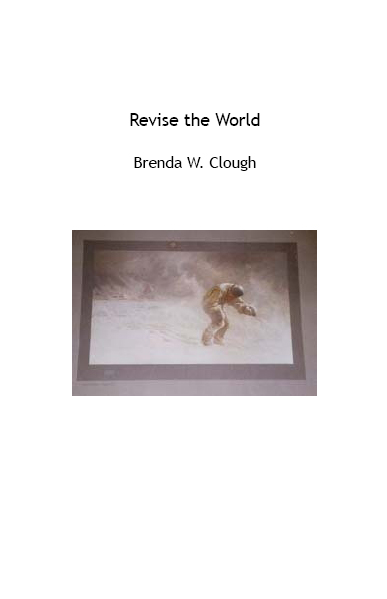Review: Revise the World by Brenda Clough
Tuesday, June 16, 2009
Revise the World
by Brenda Clough
Book View Café, 2008
E-book (PDF), 599 pages
$4.99
Despite the updated cultural background and the focus more on romance than adventure, Revise the World continually reminded me of a Golden-Age-SciFi space opera, in the vein of Doc Smith and his contemporaries. It has the same great sense of fun, and the same lack of attention to the mundane details of characterization and plotting.
The premise of the book (and the earlier novella it's built on) is that humanity has been contacted by an alien race that has told us how to bend time and space in order to accomplish faster-than-light travel. Before going whole hog and building an FTL starship, the world's governments decide to test the theory by pulling someone out of Earth's past. They settle on Titus Oates, an Arctic explorer who died on Robert Scott's polar mission in 1912; because his body was never found, they figured he was completely out of the biological and historical stream of things, and so snatching him wouldn't change anything. (It's worth noting here that the scientists in the book don't seem to be very good ones, though they're supposedly the best. Never mind that nothing on Earth is ever completely out of the life cycle; no one ever even comments on the classic time-travel-novel paradox they've gotten themselves into regarding why his body was never found. And that's par for the course for these geniuses.)
Oates's adjustment to the world in 2045 makes up the meat of the novel; in fact, we get so involved in character development that he doesn't even get to go on the foreshadowed exciting space adventure until four-fifths of the way through the (six-hundred-page!) book. Which is admittedly a departure from the Golden-Age-SciFi sensibility I'm attributing to the book, but on the other hand, putting a heroic, stereotypically manly figure like Titus Oates at the center of things makes it feel like we're on a heroic, stereotypically manly journey whether he's exploring himself and his new social situation or exploring a new world. And there's a lot to enjoy about Titus's inner journey: how he learns to think outside of himself, and the ways in which his thinking never changes; how advanced modern folk react to his antediluvian notions despite their determination to be understanding; ruminations on how a man known for stoic heroism might make his way differently than someone else of his era; all done with a nice ironic humor. (At least I hoped it was being ironic in, for instance, Titus's notion that Edwardian British men were absolutely straightforward...and in some instances I was probably only wishing it were ironic.)
Overall, Revise the World is quite good at a few of the things it sets out to achieve. It paints a relatively believable near future (and near future is the hardest future to do well), its exploration of different lenses on reality (and how we take them as truth) is interesting and well-thought-out, it has a few great jokes, and the author manages to engage the reader in her obvious feeling of having a rollicking good time playing with a nifty premise. But the novel falls down in the details, again and again; it's clumsy in pretty much every small way I could think of. The supporting characters are caricaturish, the dialogue frequently wooden, the pacing bizarre, the point of view inconsistent, and the philosophizing and psychologizing overly belabored, and there's a plot hole, inconsistency, or implausibility on nearly every page. (Not to mention the typos.) The ending doesn't cap the story arc (what there is of it); once the romantic plotline has been concluded, the narrative just stops without resolving the mysteries about the aliens that have been built up throughout the book. (Perhaps the author is planning a sequel...?)
Many of the book's problems could have been solved by a good edit. While I like Book View Café's direct-as-possible from-author-to-reader publishing philosophy in some respects, the interference of a traditional publishing house that's paying for paper and ink isn't always such a bad thing. A few memorable moments and the author's infectious sense of fun certainly gave me enjoyment in the reading, but it was counterbalanced by slogging through writing that could have been so much better with some polishing.
5 comments; 4 subscribers
book of paper(bound) 8 pencils and 8 pens
set of oil paints and some rolled up canvas's
a few brushes for painting
a jar of peanut butter
a jar of hot sauce
8 jars of honey
4 gold coins (for trade)
seeds for planting.. pumpkin, corn, beans, poppies
a bundle of cedar
a bundle of sage
8 books of matches
lipstick
a mirror
a clean dress
and extra panties
Do you have a comment? Log in or Register; registration is quick, painless, free, and spam-free (unless you ask for it)


